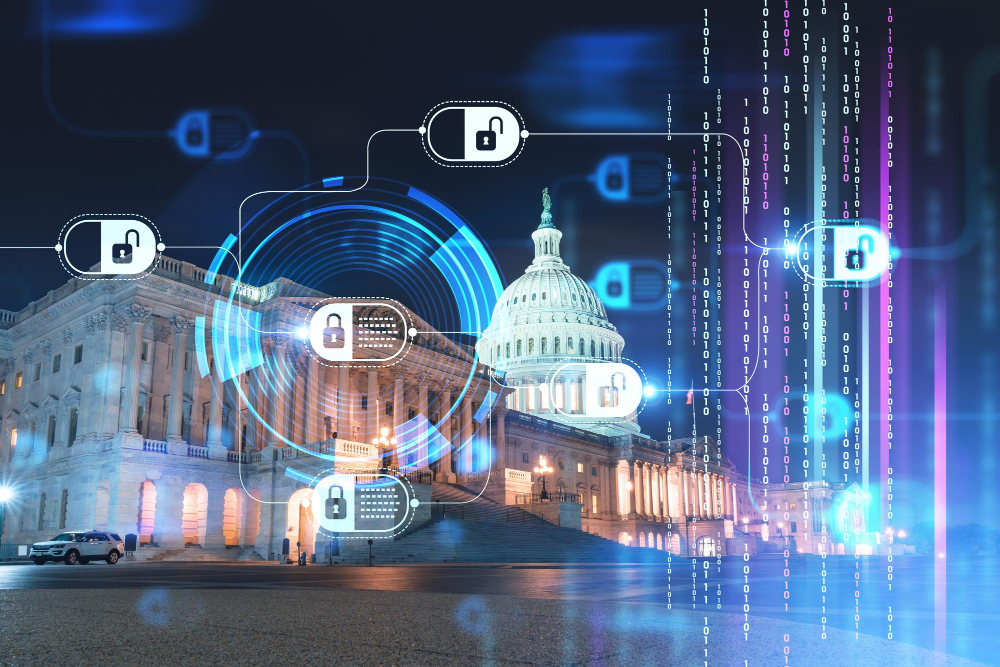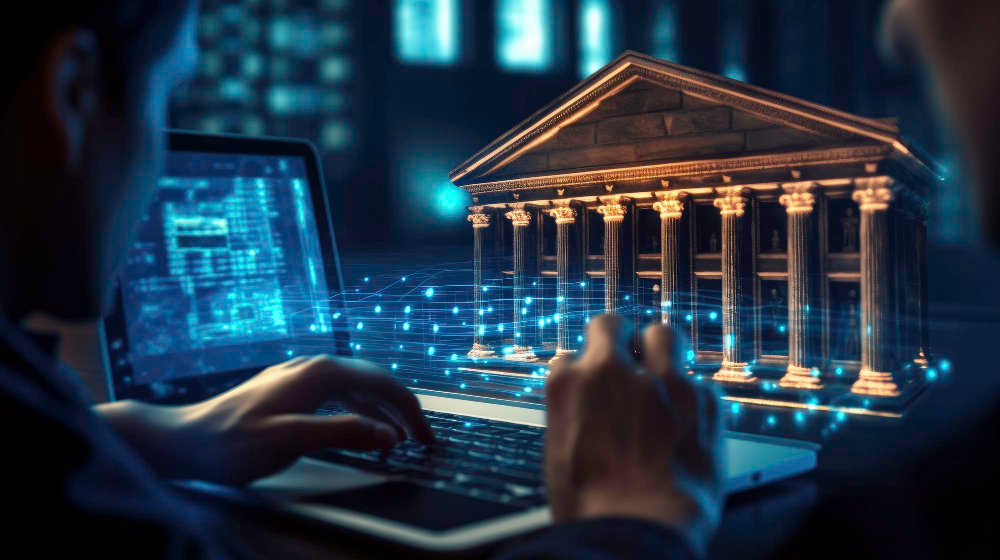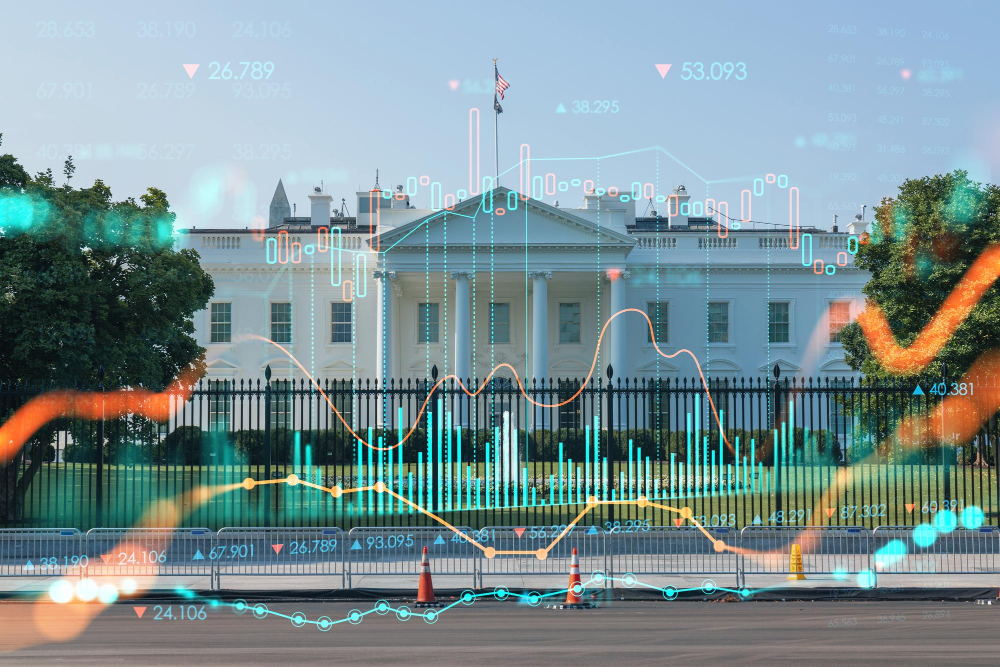Blockchain’s decentralized, tamper-proof ledger offers transparency and trust, transforming how societies govern themselves. In this article, we explore its principles, potential, and real-world applications in voting systems, identity management, and public services.
Discover how blockchain fosters participatory governance, enabling citizens to engage like never before. With cryptographic security and consensus mechanisms, it promises a more inclusive and secure governance model. Already making its mark in public administration, blockchain is reimagining processes, breaking bureaucratic barriers, and empowering individuals.
However, this technology isn’t without challenges. We’ll examine the obstacles it faces, such as scalability, privacy concerns, and regulatory complexities. By understanding these limitations, we can pave a path towards harmoniously integrating blockchain and traditional governance.

The role of blockchain for governments is nothing short of revolutionary. As a decentralized and tamper-proof technology, blockchain offers a plethora of benefits that can transform the way governments operate and serve their citizens.
One of the most significant contributions of blockchain to governments is in the realm of transparency and accountability. Traditional government systems often suffer from opacity and lack of trust, leading to skepticism and dissatisfaction among citizens. By implementing blockchain-based solutions, governments can create a transparent and immutable ledger of public records, transactions, and contracts. This increased transparency helps foster trust between the government and its citizens, as all actions are visible and auditable, leaving little room for corruption or manipulation.
Blockchain enhances the efficiency of public services and administrative processes. Smart contracts, self-executing codes triggered by predefined conditions, can automate various tasks and eliminate the need for intermediaries, reducing bureaucratic red tape and streamlining workflows. This could lead to faster and more cost-effective service delivery, benefiting citizens and businesses alike.
Digital identity management is another area where blockchain can play a pivotal role for governments. By providing individuals with self-sovereign identities stored on a blockchain, citizens gain more control over their personal information, reducing the risk of identity theft and ensuring secure access to various government services.
Additionally, blockchain can revolutionize voting systems, offering a more secure and tamper-resistant alternative to traditional voting methods. By implementing blockchain-based voting platforms, governments can enhance electoral integrity, increase voter turnout, and instill greater confidence in the democratic process.
Blockchain technology holds immense promise for transforming government processes, offering a myriad of compelling reasons for its adoption. At the heart of blockchain’s appeal lies its inherent trait of decentralization. By creating a distributed and tamper-proof ledger, blockchain ensures transparency, accountability, and trust in government operations. All transactions and data are recorded in an immutable manner, eliminating the risk of data manipulation and providing a clear audit trail for verification.
Security is another paramount advantage. The cryptographic algorithms and consensus mechanisms inherent in blockchain safeguard sensitive government information, mitigating the risks of hacking, data breaches, and unauthorized access. As a result, citizens’ data and privacy are better protected.
Moreover, the implementation of smart contracts on blockchain can revolutionize administrative processes. These self-executing contracts automate tasks, reducing paperwork, bureaucracy, and processing time, leading to more efficient service delivery and cost savings for the government.
Blockchain’s potential in digital identity management is also noteworthy. Governments can issue secure and tamper-resistant digital identities to citizens, minimizing identity fraud and streamlining access to various government services.
Additionally, blockchain can enhance electoral integrity by providing a transparent and verifiable platform for secure voting. This fosters trust in democratic processes and increases voter participation.
By embracing blockchain technology, governments can embark on a transformative journey towards digital innovation, providing citizen-centric services with heightened transparency, security, and efficiency. However, careful consideration of challenges and collaboration with relevant stakeholders are essential to ensure successful integration and maximization of blockchain’s benefits in government processes.

Blockchain technology has emerged as a game-changer in various industries, and its application in government initiatives brings forth a host of benefits that can revolutionize public administration.
Traditionally, bureaucratic procedures are often plagued by time-consuming manual tasks, redundant record-keeping, and complex approval processes. Blockchain’s decentralized nature and automation capabilities enable the creation of smart contracts that self-execute predefined actions when specific conditions are met. This eliminates the need for intermediaries and speeds up processes, reducing paperwork and administrative bottlenecks.
The transparency provided by blockchain allows for real-time tracking of transactions and activities. This enables better monitoring and accountability within government departments, fostering a culture of efficiency and responsiveness.
In the context of public spending and allocation of resources, blockchain can offer unparalleled transparency. Citizens can track how government funds are utilized, ensuring that they are directed towards projects that benefit the public interest. Additionally, blockchain-based voting systems can enhance electoral transparency, enabling citizens to validate election results and hold officials accountable for their actions.
Blockchain’s cryptographic algorithms and consensus mechanisms ensure that data stored on the blockchain is highly secure and tamper-proof. Each block contains a unique cryptographic hash of the previous block, creating an unbroken chain of data. Any attempt to alter the data in a block would require changing subsequent blocks, rendering the alteration immediately detectable.
Additionally, blockchain makes it resilient to single points of failure, reducing the risk of data loss due to hardware failure or cyberattacks. Governments can implement stringent access controls and encryption measures, providing an added layer of protection for sensitive data stored on the blockchain.
The integration of blockchain technology can lead to substantial cost savings for governments. By automating processes through smart contracts and eliminating intermediaries, governments can reduce administrative overhead and operational expenses. For instance, blockchain-powered supply chain management can streamline logistics and reduce the cost of verifying product provenance, contributing to cost-effective procurement.
Furthermore, the elimination of paper-based documentation and manual record-keeping can lead to significant savings in material costs and storage space. The digital nature of blockchain also reduces the need for physical infrastructure, cutting down on maintenance expenses.
The versatility of blockchain technology allows for its application in various aspects of government operations. Governments can harness blockchain for identity management, creating secure and tamper-resistant digital identities for citizens, businesses, and government officials. These digital identities can facilitate efficient access to government services while ensuring privacy and data protection.
Blockchain’s potential in voting systems can revolutionize the democratic process. By providing a secure and verifiable platform for elections, governments can enhance electoral integrity, increase voter participation, and build trust in the democratic system.

Blockchain technology has emerged as a powerful tool in the fight against government corruption. Its transparent and immutable ledger, decentralized nature, and smart contract capabilities contribute to enhanced accountability and trust, curbing corrupt practices that have long plagued governments worldwide.
At the core of blockchain’s corruption-fighting potential is its transparent and immutable ledger. All transactions and actions are recorded in a decentralized and distributed manner, visible to all authorized participants. This transparency leaves no room for hidden dealings, allowing citizens to independently verify and audit government activities and financial transactions. Attempts to manipulate data are immediately detectable, making it difficult for corrupt individuals to cover their tracks.
Moreover, blockchain’s decentralization and lack of a single point of control make it challenging for corrupt individuals to exert undue influence over data. No single entity can manipulate the system, ensuring a fair and transparent governance model.
Smart contracts further enhance blockchain’s anti-corruption capabilities. These self-executing codes automate government processes, reducing the need for intermediaries and minimizing opportunities for corruption arising from human intervention. For instance, smart contracts can ensure that funds are allocated to specific projects only when predefined milestones are met, preventing misallocation and misuse of resources.
Additionally, blockchain-based digital identity management provides citizens with self-sovereign identities, giving them control over their personal information. Secure digital identities reduce the risk of identity theft and impersonation, which are often exploited for corrupt activities. Efficient and fraud-resistant access to government services promotes transparency and trust.
By implementing blockchain in government processes, nations can create a more transparent, accountable, and corruption-resistant governance framework. Citizens gain confidence in their government’s actions, and officials are incentivized to act in the public’s best interest. Ultimately, blockchain technology paves the way for a more equitable and just society, benefiting citizens and promoting good governance.
The application of blockchain technology in government extends far beyond its use in financial transactions. From vaccination tracking and document validation to smart cities and central banking, blockchain presents innovative solutions for governments to enhance their services, improve efficiency, and foster trust with citizens.
Governments can leverage blockchain to streamline administrative processes and reduce operational costs significantly. By implementing smart contracts, repetitive tasks can be automated, eliminating the need for intermediaries and paperwork. This can lead to more efficient resource allocation and cost savings, allowing governments to optimize their budgets and direct funds to critical areas such as healthcare, education, and infrastructure.
One of the fundamental characteristics of blockchain is its immutable and tamper-proof nature. Governments can use blockchain as a secure and reliable means of storing critical records and data. Vital documents, public records, and historical archives can be stored on the blockchain, ensuring their authenticity and preventing unauthorized alterations or data loss.
Blockchain-powered land title registries offer a secure and transparent way to manage property ownership records. The decentralized and immutable nature of blockchain ensures that land title information is accurate and cannot be tampered with. This reduces the risk of fraudulent land transactions and disputes, providing citizens with greater confidence in property rights.
Blockchain-based e-voting systems hold the potential to revolutionize the electoral process. By offering a transparent and tamper-resistant platform for voting, governments can enhance electoral integrity, increase voter turnout, and provide real-time election results. Blockchain e-voting systems are resilient against cyberattacks and ensure the privacy of individual votes.
Blockchain can streamline payroll tax collection and reduce tax evasion. Through the use of smart contracts, payroll taxes can be automatically deducted and transferred to the appropriate government agencies. This reduces the administrative burden on businesses and ensures accurate and timely tax collection, contributing to increased tax compliance.
Blockchain technology can play a crucial role in the efficient and secure tracking of vaccination records. With the ongoing global focus on healthcare and vaccination drives, governments can use blockchain to create a decentralized and interoperable system that securely stores individuals’ vaccination data. This tamper-proof and accessible database enables healthcare providers to verify vaccination status accurately and allows for effective monitoring of immunization coverage at the national level. Blockchain-based vaccination tracking systems can streamline public health responses, ensuring timely vaccinations and facilitating the containment of disease outbreaks.
Blockchain offers a trustworthy solution for document validation and verification. Governments can create a decentralized repository for essential documents such as birth certificates, academic degrees, and licenses. By storing these records on a blockchain, citizens and authorities can easily access and verify the authenticity of documents without relying on centralized entities. This can significantly reduce the risk of document forgery and improve the efficiency of administrative processes, such as employment verification and academic credential assessments.
Managing student loans can be a complex and challenging task for governments and educational institutions. Blockchain technology can streamline the student loan process by creating a transparent and auditable system for tracking loan disbursements, repayments, and outstanding balances. Smart contracts can automate loan repayment schedules and facilitate direct transactions between borrowers and lenders. This transparent and efficient student loan tracking system ensures accountability and reduces the risk of default, benefiting both students and government agencies.
Blockchain is a cornerstone technology for building smart cities of the future. By integrating various IoT devices and sensors with blockchain, governments can create a secure and interconnected infrastructure that facilitates data sharing and analytics. This enables better urban planning, efficient resource allocation, and improved citizen services. Blockchain’s decentralized architecture also enhances data privacy and security, ensuring that sensitive information remains protected in the context of a connected city.
Central banks can benefit from blockchain technology in various ways. Central bank digital currencies (CBDCs) based on blockchain offer a more efficient and secure means of transferring funds and executing monetary policies. Blockchain-based systems can also enhance cross-border payment systems, reducing settlement times and transaction costs. Additionally, blockchain can provide transparency in central bank operations, increasing public trust in monetary policies and financial stability.
Blockchain can revolutionize the government procurement process by increasing transparency, efficiency, and accountability. With traditional procurement systems, there can be issues of opacity and favoritism in awarding contracts, leading to potential corruption and mismanagement of public funds. By implementing blockchain-based procurement platforms, governments can create a decentralized and auditable system that records each step of the procurement process. This includes vendor registration, bidding, contract awarding, and payment verification. The transparency of blockchain ensures that all transactions are visible and tamper-proof, reducing the risk of fraud and corruption. Additionally, smart contracts can automate contract compliance and payment disbursement, streamlining the entire procurement lifecycle.
Blockchain-based digital identity management provides citizens with self-sovereign identities, empowering individuals to control their personal information securely. Traditional identity systems often rely on centralized databases, making citizens vulnerable to identity theft and data breaches. With blockchain, citizens can create and manage their digital identities, which are cryptographically secured on the blockchain. Governments can issue verified credentials and attributes, such as citizenship, age verification, or professional qualifications.
As governments continue to explore and embrace blockchain-based solutions, the potential for positive impact on governance and public administration is vast and promising.

Estonia is a pioneer in using blockchain technology for government services. It has implemented an e-residency program that allows individuals from anywhere in the world to become virtual residents of Estonia and access digital services. Blockchain is utilized for secure digital identity management, enabling e-residents to digitally sign documents, set up companies, and conduct online banking securely.
Georgia has integrated blockchain in its land registry system to enhance transparency and reduce corruption. The country has digitized its land titles on the blockchain, ensuring secure and immutable records of property ownership. This initiative has increased trust in the property registration process and facilitated easier transactions in the real estate sector.
Georgian citizens initiate a title registration request with a notary, who records the title on the private Exonum blockchain. The Exonum hash is then anchored on the public Bitcoin blockchain. NAPR issues cryptographically encrypted digital asset certificates to the citizens.
In Malta, the Ministry for Education and Employment (MEDE) has adopted the Blockcerts platform to manage the nation’s academic records. This blockchain framework enables the creation, issuance, viewing, and verification of academic credentials for Maltese citizens.
Using the Blockcerts app, citizens can enlist their academic institutions as issuers of certificates. The institution then creates a certificate with its private key and the citizen’s public key. The certificate is automatically saved in the citizen’s Blockcerts wallet through the inclusion of the public key. Additionally, the issuer hashes the certificate onto the blockchain.
In the Swiss city of Zug, the government utilizes the Ethereum blockchain for issuing decentralized IDs, called uPort. Launched in November 2017, the project initially focused on residential proof and has since expanded to include other municipal services, such as voting.
The uPort app serves as the users’ interaction point with the system. To ensure identity validity and protection in case of device loss, the protocol employs two smart contracts: a controller contract and an identity contract.
The identity contract contains an individual’s primary and stable identification data, allowing interactions with other smart contracts and uPort identities. On the other hand, the controller contract oversees the identity contract, managing authorization of sign statements and assigning new public keys in case of device changes.
In 2020, the UAE witnessed the implementation of several blockchain projects across various sectors. The Ministry of Health and Prevention (MoHAP), along with other authorities, launched a blockchain-based medical platform to record and store healthcare data for practitioners and institutions.
The Abu Dhabi Commercial Bank (ADCB) collaborated with the dltledgers platform to launch a blockchain-based trade finance platform. ADCB became the first bank in the country to execute an end-to-end automated blockchain trade finance transaction, ensuring end-to-end trade transparency with digitized documents.
Other notable blockchain projects in the UAE include a blockchain-powered eCommerce platform by Dubai Customs, a blockchain-based digital passport system by Dubai Immigration and Visas Department, and the DMCC Crypto Centre to support crypto and blockchain technology companies.
Furthermore, collaborations between IBM and Dubai’s Department of Economic Development resulted in a blockchain-based registry to share information about registered companies.
In South Korea, renowned for its technology and online services, blockchain has not been overlooked. The government is actively developing the ICON platform, the country’s largest blockchain project, aiming to bridge the online community with industries like banking, healthcare, and government.
Three enterprise applications currently run on the ICON blockchain:
The South Korean commercial bank, Shinhan Bank, chose Zzeung for the country’s first blockchain-based Know Your Customer (KYC) financial authentication service.
In the United States, several government agencies have explored blockchain applications. The Food and Drug Administration (FDA) has piloted blockchain for tracking pharmaceuticals, while the Department of Homeland Security (DHS) has researched blockchain for securing data sharing and identity verification.
The U.S. Department of Health and Human Services (HHS) launched the Accelerate program, the first federal government blockchain-based initiative, to reduce procurement costs.
The blockchain infrastructure enables HHS staff to view supplier interactions, check financial records, detect price discrepancies, and review past contracts, leading to automatic price reductions.
Chile has been actively researching blockchain technology for various applications, including supply chain management, trade finance, and land registry. The government’s interest in blockchain reflects its potential to enhance efficiency and transparency in different sectors.
China has taken a significant interest in blockchain technology and is exploring its use in various government initiatives. The country is actively developing its central bank digital currency (CBDC) and has launched pilot projects for blockchain-powered supply chain management and e-government services.
In the Isle of Man, the government has integrated smart contracts into its state lottery system, revolutionizing the gaming experience. When a lottery ticket is purchased, the smart contract automatically deducts the money, and randomized numbers are generated. Winners who match the jackpot numbers receive instant and automated payouts, enhancing the efficiency and transparency of the process.
Moreover, beyond the lottery application, the Isle of Man government has utilized smart contracts to streamline routine contracts and financial arrangements. This innovative technology has significantly reduced the time and complexities associated with establishing such agreements, leading to increased efficiency and accuracy in various government operations.
In Denmark, the Liberal Alliance party has implemented a cutting-edge blockchain-based e-voting system, revolutionizing the electoral process. This secure and verifiable platform ensures the integrity of national elections, instilling confidence in the democratic process.
Through the blockchain-based e-voting system, all citizens benefit from easier and more accessible voting methods. The platform promotes inclusivity and encourages greater voter participation, leading to a more representative and engaged democracy.
Venezuela made history by becoming the first federal government to launch a digital currency called the petro. The country faced severe economic challenges, including hyperinflation and economic sanctions imposed by the United States, which led to the devaluation of its traditional currency. The introduction of the petro aimed to address these economic woes and provide an alternative form of currency for the Venezuelan population.
In the face of hyperinflation, many Venezuelans turned to cryptocurrencies, including the petro, as a means to hedge against the devaluation of the national fiat currency. Cryptocurrencies offered a more stable and secure store of value, providing some relief for individuals and businesses grappling with the economic uncertainty.

Blockchain technology has the potential to transform government operations, offering improved efficiency, transparency, and data security. However, its widespread adoption in the public sector faces several obstacles.
Regulatory and legal challenges arise due to the cross-border nature of blockchain networks, requiring harmonization of laws and regulations internationally. Scalability is crucial to handle large-scale government operations effectively. Interoperability with existing legacy systems is a challenge in integrating blockchain.
Data privacy concerns arise as blockchain offers transparency, but may also compromise sensitive government information. Striking the right balance is essential. Education and awareness programs are needed to familiarize government stakeholders with blockchain.
Cost and budget constraints may deter adoption, requiring careful evaluation of the cost-benefit analysis. Resistance to change from within the government bureaucracy is a common hurdle.
Environmental impact is a concern, with some blockchain networks consuming substantial energy. Governments must explore energy-efficient alternatives.
Robust cybersecurity measures are essential to safeguard government blockchain systems from potential threats.
By addressing these obstacles, governments can unlock the full potential of blockchain technology and create a more efficient, transparent, and citizen-centric governance ecosystem.
The future of blockchain in government is promising, offering efficient, transparent, and citizen-centric governance. As the technology matures and challenges are addressed, exciting possibilities emerge.
Blockchain can revolutionize public services, streamlining processes and automating transactions for faster and more efficient delivery. Decentralized governance powered by blockchain empowers citizens, ensuring transparent and tamper-proof elections for increased trust in democracy.
Secure digital identity systems based on blockchain provide citizens with control over their data, protecting against identity theft and simplifying access to services. Improved supply chain management using blockchain enables real-time tracking and verification of product authenticity, enhancing trade efficiency and food safety.
Transparent budget allocation through blockchain fosters accountability and reduces corruption. Smart cities of the future will benefit from blockchain-integrated IoT devices, enabling sustainable urban planning and resource management.
Blockchain facilitates cross-border collaboration among governments, fostering international cooperation in trade, environmental protection, and disaster response.
As governments worldwide embrace blockchain, its integration into infrastructure promises inclusive, responsive governance, transforming society through enhanced services and decision-making processes.
Blockchain technology has the potential to revolutionize government operations and usher in a new era of transparent, efficient, and citizen-centric governance. As demonstrated by various successful initiatives across different countries, blockchain offers solutions to critical challenges, such as data security, fraud prevention, and streamlined processes.
The adoption of blockchain in government holds the promise of enhanced public services, improved decision-making, and increased citizen engagement. Its decentralized nature empowers individuals, fostering trust in democratic processes and promoting greater transparency in government actions.
However, realizing the full potential of blockchain in the public sector requires addressing regulatory, scalability, and interoperability challenges. Governments must invest in education and awareness programs to familiarize stakeholders with blockchain’s benefits and build a supportive ecosystem for its adoption.
Collaboration between governments, technology experts, and industry players will be crucial in harnessing the transformative power of blockchain technology. By overcoming obstacles and embracing innovation, governments can create more resilient, accountable, and citizen-centric governance systems that truly benefit society at large.